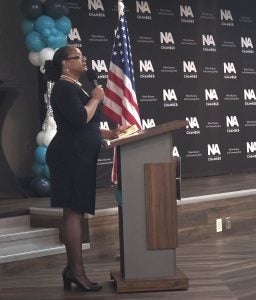
Dr. Rick Franza, Dean of the Hull College of Business, discusses a different, timely business topic each Monday in this column. This week, he talks about the impact of inflation on nonprofit organizations. The interview has been edited for clarity and impact.

ABD: With inflation still at a 40-year high, many companies are facing increased costs that will probably be passed on to customers through higher prices. But what is the impact of inflation on nonprofits that rely on donations and grants?
Rick: It’s a double whammy for them. They get it on both ends – rising costs and decreasing revenue. People are less willing to give when they’re being pinched. The last 12 months have had an impact on nonprofits but they may get lucky because we’re at the end of the year when a lot of people are giving. The good news is that people with means got a good report this week about the Consumer Price Index (CPI) that shows inflation eased slightly, a little more than expected, so the markets were up.
But nonprofits also have costs that go up. Those that do distributions, like Golden Harvest Food Bank, are seeing fuel costs having an impact. It affects their employees because nonprofits are probably not raising wages for employees, many are in nonprofits because that’s where their heart is.
ABD: What are some things nonprofits can do to offset this double whammy?
Rick: First and foremost, get more volunteers, especially if there’s attrition from losing labor because you can’t afford the wages. People may have less money to give but they’re willing to volunteer their time. It’s also a time to improve processes – if you do that, you can get more bang for your buck.
You can also time your appeals for when there is good economic news, like the CPI report. And if you have funds that are restricted use, like many nonprofits do, you could go to the benefactors to see if there can be some temporary easing on what you can use the funds for. Also, you can negotiate with your suppliers for better terms.

ABD: One of the things we’ve heard and is apparently true, is that the Augusta area has more nonprofits per capita than any other city. Does all that competition for donor dollars hurt more when the economy gets tight?
Rick: I’d rather be in a place with a lot of competition if I’m also in a place where the giving is good. Probably, overall nonprofits will be hurt less in Augusta than in other places because people in Augusta are good givers. Some of that is a Southeast thing, some is church related.
ABD: With higher prices making things a little tighter for many people and businesses, should they still be willing to donate to nonprofits?
Rick: Yes, because they’re still getting value from it. From a return-on-investment point of view, it’s better than anything else because it decreases your tax rate. From a community point of view, more people are suffering right now. I’m a proponent of finding other things you can cut out of your budget so you can give. It’s probably a good thing to give up a few Starbucks so somebody can eat.
It doesn’t have to be money. There’s in-kind giving. Sometimes, you have things sitting around the house that you don’t need or want that someone else could use. Giving your time is important, too.
ABD: Giving can often benefit the giver as much as the nonprofit, right?
Rick: Giving is a demonstration of gratitude, and there have been lots of studies that show the best thing for mental and physical health is an attitude of gratitude. The less you have, the more meaningful it is to give. I’ve always felt that the more I give, the more I’m blessed in return.







